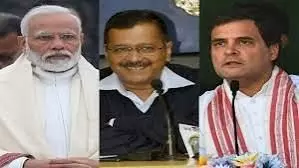Politics Of Work Versus Politics Of Optics: Why Delhi Must Choose Wisely

While the problem of flight cancellations due to intense fog persists, as in previous years, the political discourse in Delhi has undergone a dramatic shift since the last election. With the Election Commission about to announce the date of the elections anytime now, it is refreshing to note the absence of a ‘Hindu-Muslim’ angle or caste based violence. Thanks to the humiliating drubbing that the BJP witnessed for spreading hate against the protestors of the CAA-NRC bill, the saffron party seems to have learnt their lesson. Besides, it is the Aam Aadmi Party’s concerted effort that too should be lauded to keep the narrative tied to good governance, development, healthcare and education.
That’s why, perhaps, for the first time one would have heard PM Modi raising parking & traffic congestion issues (ironically his own convoy causes maximum inconvenience to the common man) at an election rally in Delhi last week. In fact, while laying the foundation stone for 2 new campuses of Delhi University and a new college on January 03, PM Modi criticised Delhi’s current education system. But Kejriwal was not the one to take it lying low. The Aam Aadmi Party supremo Arvind Kejriwal was quick to rebut highlighting that they do ‘Kaam ki Rajneeti and not Shilanayas ki RajRajneeti’, a direct attack on PM Modi.
Hard Facts is the reason why AAP is always on the offensive over the issue of higher education. Here’s why The Union Government allocated only 0.98% (Rs 47,620 crore) of the total budget 2024-2024 for higher education. After the money is allocated to 28 states and 7 UTs, what comes to Delhi is a negligible fund. The Delhi government on the other hand, in 2024-2025 alone, allocated 1.19% (Rs 943.41 crores) of their total budget (Rs 79,000 crores) for the department of higher education including technical, non-technical, and sports expenditure.
Another reason for the AAP to flex on the issue is that the AAP government's education expenditure has been the highest across all state governments and the central government for 2023-2024. As per the Delhi economic survey tabled in March this year, the AAP government informed that they have spent 21.1% of their aggregate expenditure on education in 2023-24. This remains the highest expenditure by any government to date, the national average for the education expenditure remained 13.3% for the same year.
Kejriwal further boasted how in the last nine years, the AAP government had established three fully functional new universities and upgraded a college as a university and inaugurated six new university campuses after all, since the party’s inception Kejriwal has maintained, ‘For AAP, education is our topmost priority, because we strongly believe that education is the best antidote to poverty.’
The three new universities include the Delhi Skill and Entrepreneurship University (2020). With 23 campuses, the university offers hands-on education in BSc in Aesthetics and Beauty Therapy, Medical and Laboratory Sciences, and BBA in Facilities and Hygiene Management.
While another university built under AAP is the Delhi Teachers' University (2022), which seeks to develop outstanding teachers through creative programs, and the third one is the Delhi Sports University (2020), established with the objective to train future Olympians.
The AAP also argues that to increase access to higher education, they upgraded the Netaji Subhas University of Technology as a full-fledged university, which now offers advanced engineering and technology programs.
Besides, the six new academic blocks built by AAP include Delhi Technological University (East Delhi), Ambedkar University (Karampura and Lodhi Road), Netaji Subhas University of Technology (Jaffarpur Kalan and Geeta Colony), and Guru Gobind Singh Indraprastha University (East Campus).
Speaking on the same, Delhi CM Atishi said, “Over the last decade, the Delhi government has not only improved schools but also taken decisive steps to secure the future of students beyond Class 12. Ten years ago, Delhi had just 83,600 college seats. Through persistent efforts, this number has been increased to 1.55 lakh seats by establishing new universities and expanding the capacity of existing ones.”
